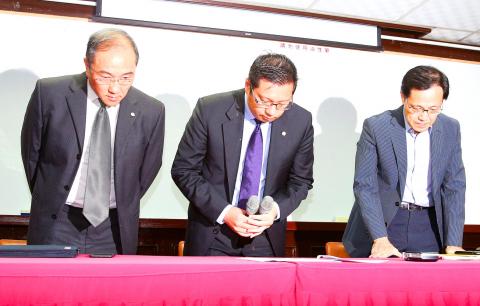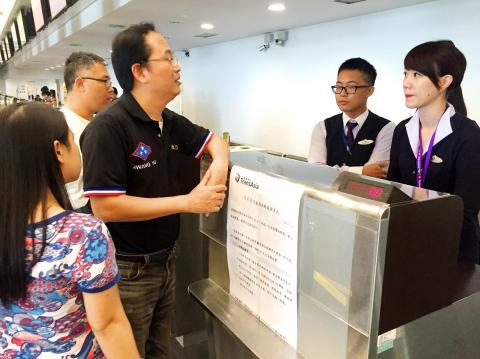TransAsia Airways Corp (復興航空) yesterday said it is to dissolve the company after its attempts to keep it afloat failed.
The company looked at options, including a sale, restructuring and capital injections, during three meetings between its board of directors and industry experts, TransAsia Airways chief executive officer Liu Tung-ming (劉東明) told a news conference at the Taiwan Stock Exchange.
“Despite our best efforts to devise a new business model, the company could not produce an effective turnaround plan to repair its deteriorating finances,” Liu said.

Photo: CNA
The airline said it is unable to repay US$75 million in European convertible bonds due on Tuesday next week.
The company’s net worth was estimated at about NT$5.44 billion (US$170.29 million), or a book value of NT$7.17 per share, as of the end of last month, TransAsia vice president Chen I-chieh (陳逸潔) said.
The airline operated 27 routes in Taiwan, China and the rest of Asia, each representing about a third of total sales, Chen said.

Photo: Lee Chung-hsien, Taipei Times
In the first three quarters, the company racked up losses of NT$2.2 billion, Liu said.
TransAsia chairman Vincent Lin (林明昇) blamed the declining number of Chinese visitors, as well as rising fuel prices and a strengthening US dollar, for the company’s steep losses.
TransAsia’s load factor had fallen to about 60 percent, which was well below its domestic peers’ and unsustainable, Lin said.
TransAsia shares are to resume trading today following yesterday’s suspension, but trading would be conducted on a full-cash delivery basis, the Financial Supervisory Commission (FSC) said.
At a news conference held jointly with the heads of government agencies yesterday, the Cabinet said that the impact of the airline’s closure would be limited and the company has enough cash to refund customers and cover severance pay.
An estimated 100,000 travelers are affected by the unexpected folding of the nation’s first commercial airline, but other carriers have capacity to take on passengers booked to fly with TransAsia as it is the off-season, Civil Aeronautics Administration (CAA) Air Transport Division director Han Chen-hua (韓振華) said.
TransAsia has created a trust fund to ensure that customers get a full refund on booked flights, and the company will not dismiss ticketing and customer service staff until Dec. 20, so that they can assist in the transfer of passengers to other airlines, the firm said.
The CAA formed a special task force immediately after TransAsia announced a temporary suspension of operations on Monday to ensure that travelers’ rights are protected, Fan said.
The CAA is to impose a fine of between NT$600,000 and NT$3 million on TransAsia for halting flights without seeking prior approval.
The CAA has conducted regular financial inspections on TransAsia, and the company still holds more than NT$1 billion in cash and is not facing an immediate financial crisis, Han said.
TransAsia has 1,735 employees and they are covered by labor insurance, while there is NT$310 million in the company’s pension fund account, Deputy Minister of Labor Kuo Kuo-wen (郭國文) said.
“The money is more than enough to pay employees’ pensions and the remaining amount can be used to cover severance pay,” Kuo said.
The FSC and prosecutors have launched an inspection into possible insider trading in the company’s shares, and it has yet to be determined whether company executives were involved, commission vice chairman Huang Tien-mu (黃天牧) said.
The Taiwan Stock Exchange on Aug. 15 listed TransAsia as financially unstable, to warn investors of the risk involved in trading the company’s shares, Huang said.

The Ministry of Foreign Affairs (MOFA) yesterday said it is closely monitoring developments in Venezuela, and would continue to cooperate with democratic allies and work together for regional and global security, stability, and prosperity. The remarks came after the US on Saturday launched a series of airstrikes in Venezuela and kidnapped Venezuelan President Nicolas Maduro, who was later flown to New York along with his wife. The pair face US charges related to drug trafficking and alleged cooperation with gangs designated as terrorist organizations. Maduro has denied the allegations. The ministry said that it is closely monitoring the political and economic situation

UNRELENTING: China attempted cyberattacks on Taiwan’s critical infrastructure 2.63 million times per day last year, up from 1.23 million in 2023, the NSB said China’s cyberarmy has long engaged in cyberattacks against Taiwan’s critical infrastructure, employing diverse and evolving tactics, the National Security Bureau (NSB) said yesterday, adding that cyberattacks on critical energy infrastructure last year increased 10-fold compared with the previous year. The NSB yesterday released a report titled Analysis on China’s Cyber Threats to Taiwan’s Critical Infrastructure in 2025, outlining the number of cyberattacks, major tactics and hacker groups. Taiwan’s national intelligence community identified a large number of cybersecurity incidents last year, the bureau said in a statement. China’s cyberarmy last year launched an average of 2.63 million intrusion attempts per day targeting Taiwan’s critical

‘SLICING METHOD’: In the event of a blockade, the China Coast Guard would intercept Taiwanese ships while its navy would seek to deter foreign intervention China’s military drills around Taiwan this week signaled potential strategies to cut the nation off from energy supplies and foreign military assistance, a US think tank report said. The Chinese People’s Liberation Army (PLA) conducted what it called “Justice Mission 2025” exercises from Monday to Tuesday in five maritime zones and airspace around Taiwan, calling them a warning to “Taiwanese independence” forces. In a report released on Wednesday, the Institute for the Study of War said the exercises effectively simulated blocking shipping routes to major port cities, including Kaohsiung, Keelung and Hualien. Taiwan would be highly vulnerable under such a blockade, because it

UNDER WAY: The contract for advanced sensor systems would be fulfilled in Florida, and is expected to be completed by June 2031, the Pentagon said Lockheed Martin has been given a contract involving foreign military sales to Taiwan to meet what Washington calls “an urgent operational need” of Taiwan’s air force, the Pentagon said on Wednesday. The contract has a ceiling value of US$328.5 million, with US$157.3 million in foreign military sales funds obligated at the time of award, the Pentagon said in a statement. “This contract provides for the procurement and delivery of 55 Infrared Search and Track Legion Enhanced Sensor Pods, processors, pod containers and processor containers required to meet the urgent operational need of the Taiwan air force,” it said. The contract’s work would be